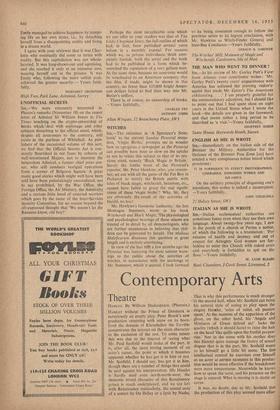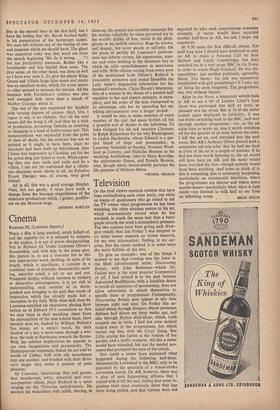Contemporary Arts
Theatre
HAMLES. By William Shakespeare. (Phoenix.) HAMLET without the Prince of Denmark is notoriously an empty play. Peter Brook's new production returning with snow on its boots from the domain of Khrushchev the Terrible concentrates the interest on the main character to the exclusion of the rest. To some extent this was due 'to the interest of seeing what Mr. Paul Scofield would make of the part. It is, after all, the most testing moment of an actor's career, the point at which it becomes apparent whether he has got it in him or not. Mr. Scofield, I should say, has got it in him, though there are a number of things that could be said against his interpretation. His Hamlet is hardly mad even north-north-west; the dmmonic brutal character of this Renaissance prince is much underplayed, and we are left with Renaissance melancholy, the muted note of a sonnet by Du Bellay or a lyric by Nashc. That is why this performance is much stronger in the second half, when Mr. Scofield can bring his natural style of acting to play upon the elegaic Hamlet, 'calm of mind, all passion spent.' At the moment of the apparition of the ghost. on the other hand, his 'Angels and Ministers of Grace defend us!' lacks the quality (which it should have) to raise the hair on the head 'like quills upon the fretful porpen- tine.' Nor in the scene with his mother does this Hamlet quite manage the frenzy of sexual disgust that is in the part. Mr. Scofield wants to let himself go a little hit more. The fine intellectual control he exercises over himself as an actor at certain moments in this produc- tion would be more effective if the breakdowns were more tempestuous. Meanwhile he knows how to speak the verse, and his presence on the stage is assured. What is missing is le diable au corps.
It was, no doubt, due to Mr. Scofield that the production of this play seemed more effec•
Nye in the second than in the first half, but I have the feeling that Mr. Brook boobed badly in his presentation of the battlement scenes. We were left without any of the feeling of awe and suspense which we should have. The ghost was majestical (why was that word cut from the speech beginning 'We do it wrong . . .'?) but not particularly awesome. Rather like a headmaster and less fearful than some. The play scene, on the other hand, was done as well as I have ever seen it. To give the player King, Queen and Villain large false noses and masks was an excellent stroke, which, for some reason or other seemed to increase the tension. All the business with Fortinbras's soldiers was also well managed with more than a smack of Mother Courage about it.
The rest of the cast supported Mr. Scofield with varying degrees of success. Mary Ure, I regret to say, is no Ophelia. Not till the mad scenes did she bring it out, and then by a trick of production, presenting Ophelia as reverting or changing to a kind of bobby-soxer tart. This metamorphosis was successful from the point of view of shock, but the contrast was not as pointed as it ought to have been, since no character had been built up beforehand. Alec Clunes was impressive as Claudius, yet for me his jovial king just failed to work. While agree- ing that one may smile and smile and be a villain, I am not yet convinced that a villain- ous character never shows at all. As Polonius Ernest Thesiger was, of course, very good indeed.
All in all, this was a good average Hamlet. Neat, but not gaudy, it must have made a change from the baroque magnificence of the elaborate productions which, I gather, prolifer- ate on the Moscow stage.
ANTHONY HARTLEY



































 Previous page
Previous page